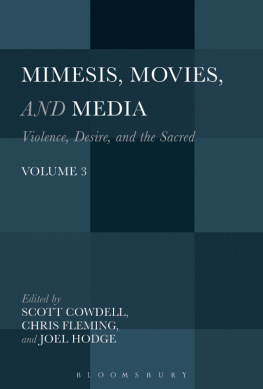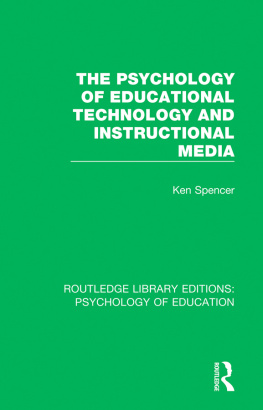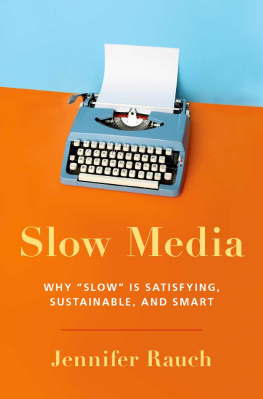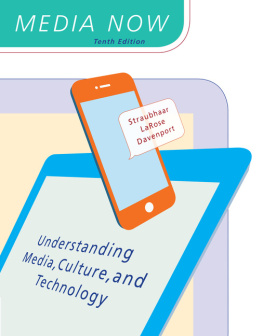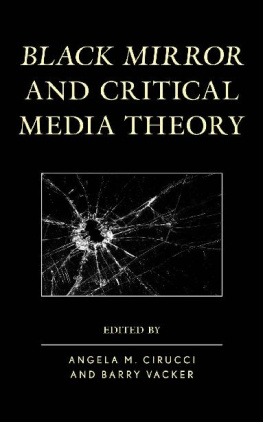Patton and Woods hit the pause button on the constant stream of digital distractions and reintroduce the biblical concept of rest. Battle tested in classes on pop culture across many years of teaching, the authors proposals are aimed at developing self-awareness concerning our habits of consuming digital content. For a world bombarded by advertising and awash in social media, this book is a lifeline to a welcoming haven, a manual for young and old alike in converting boredom into moments of reflection and spiritual transformation.
Jonathan Armstrong , Professor of Bible and Theology, Moody Bible Institute
I am profoundly thankful for Everyday Sabbath . With a deep sense of love and concern for their readers, Patton and Woods offer wise and practical advice on how to engage with media, technology, and culture in ways that are pleasing to God. Let us reclaim the Three Sacreds intentionality, interiority, and identityand put our digital world in its proper place.
Diane M. Badzinski , Chair and Professor of Communication, Colorado Christian University
Three cheers for this much-needed book! Patton and Woods faithfully help readers reclaim the Sabbath, guiding them through the choppy waters of digital dominance, screen addiction, and the constant quest for more. No judgment from these pages, only support. These two seasoned scholars remind us that the practical wisdom of the Sabbath is still within our grasp. A word in season, indeed!
Stephanie Bennett , Professor of Communication and Media Ecology, Palm Beach Atlantic University
This is a must-read if you are seeking to mindfully use technology. This book provides scriptural and spiritual rationale for taking control of your media use to have more time each day for relationships, spiritual growth, and personal discernment. This book aims to help you develop Christ-like habits with technology, and with its scriptural references, personal reflection questions, and practical tips. It delivers!
Renee Bourdeaux , Assistant Professor of Communication Studies, Northwest University, author of Communicating Love in Relationships
In encouraging the faithful to reimagine the practice of Sabbath, this bookwiselydoesnt ignore popular culture or pretend that Christians are immune to the influences of a larger society. Instead, Patton and Woods provide a path for Christians to live with intentionality in their relationship to both media and culture, becoming careful consumers of messaging while also developing spiritual practices that help mindful readers deepen their communion with God.
Jonathan M. Bowman , Professor of Communication Studies, University of San Diego
In an age of distraction and disorientation, Patton and Woods offer timely guidance on how to resume the dance. Anyone wanting to reclaim healthy, holy habits from the domineering influences of media will appreciate this book.
Dennis Cali , Distinguished Professor of Arts and Sciences, University of Texas at Tyler
If you are searching for an effective resource that can help you develop a deeper love and knowledge of God and fits perfectly in any small group whether in a church, a youth group, dorm-floor discussion group, or just a sacred conversation among friends, you have found it in this book. It is a resource that is easy to access and filled with ready-made questions that will help foster transformative discussions in person or by distance, as we seek to draw closer to God, so that we may become better reflections of his love to a hurting world.
Tom Carmody , Professor of Communication Studies, Vanguard University
Just the book we need right now. Everyday Sabbath provides the thinking Christian with practical tools to navigate the vast ocean of technology and media in which we are immersed. In addition to offering creative exercises to help readers reflect on their media use, Patton and Woods provoke contemplation of existential questions beginning with a rich discussion of ones ultimate calling. The authors advocate stewarding the stirrings of the soul, a refreshing reminder of becoming more sensitive to lifes inspirational encounters, evenand especiallyon social media. A bonus is the authors offering of a Pop Culture Shema to inspire and haunt us in discerning what is at stake in our mass-mediated choices.
Terri Lynn Cornwell , Commissioned Pastor, Presbyterian Church (USA)
This is a book that is desperately needed for these times. In a very real way, social media, technology, and streaming content threaten to enslave us and rob us of the joy of daily living. Far from advocating mere abstinence, Everyday Sabbath offers enormously practical and insightful guidance on how to navigate and make better (and wiser) our pop culture habits.
Paul A. Creasman , Chair and Professor, Department of Communication, Arizona Christian University
Patton and Woods tap into ancient wisdom and the eternal relevance of Scripture to brilliantly light a path forward through this contemporary conundrum. Spiritual shepherds and those desiring a deeper spirituality will find a humble and helpful guide in the pages of this book. So, step away from technology, take a Sabbath rest with this book, and then step right back into our digital culture to see God at work. Better yet, why not do that with others in a small group from your church? The authors have provided questions at the end of each chapter for a group of people to wrestle with together.
Dave Dawson , Campus and Leadership Development Director, Bethel Church, Richland, Washington
Everyday Sabbath is a much needed and a most relevant digital media literacy resource for spiritual formation. An invaluable tool, it affirms the gift of media and technology while directing us to pathways of spirituality of resistance to passive consumption of digital media. Complete with how-to techniques for cultivating everyday spirituality in incremental moments, the book is a timely wake-up call to live into ones timeless vocation: love of God and care for the neighbor.
Glory E. Dharmaraj , President, World Association for Christian Communication-North America
Everyday Sabbath is a keystone work at a time when the need for mindful and sacred interaction with media and technology is greater than ever before. The authors provide a space for readers of faith to understand and use pop culture and modern communication technologies to flourish and fulfill the purpose for which they were created. Patton and Woods offer a pathway for faithfully entering rest in Gods presence and becoming people involved in the work of redemption every day.
Denise Edwards-Neff , Interim Dean and Professor of Communication, College of Liberal Arts and Sciences, Azusa Pacific University
Drs. Patton and Woods provide timely counsel and advice for their readers in calling for the practice of Christian Shema: the act of intentionally listening for and therefore hearing truth from God, considering its claims and requirements, then making personal application to live within Gods will and influence. This discipline stands in stark contrast to the lack of intentional hearing and living practiced, unintentionally, by the majority of twenty-first-century peoples. Everyday Sabbath calls Christians to take ownership of their own lives, influences, and choices, rather than allowing pop culture to influence and shape their thinking and actions.
Brent Ellis , President, Spring Arbor University
This is the book weve been waiting for! Ive read numerous thoughtful works on media literacy from various perspectivesincluding Christianand each one had something important to contribute to the conversation. Everyday Sabbath , however, gets to the heart of our interaction with pop culture and media technology. Patton and Woods share their inspired ideas in ways that are both scholarly and practicaldeep and accessible. This book takes the reader on a self-reflective journey toward not only a better relationship with pop culture but a deeper relationship with God and our fellow humans. It is essential reading for anyone wanting to make the most of her high calling as a Christian in our mediated culture. We need this book, and Im excited to share it with my colleagues and students.



